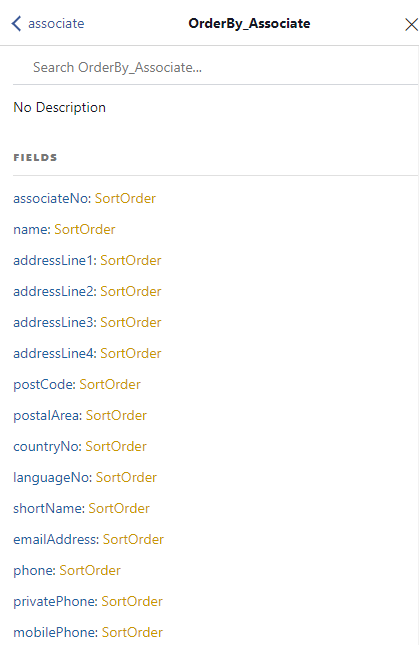Sorting
For every query, you can specify a sorting expression through the orderBy parameter on each connection. Every connection has the orderBy parameter, although its type differs for each connection. The name format is OrderBy_<tablename>. Therefore, the sort order types have names such as OrderBy_Associate or OrderBy_GeneralLedgerAccount. This sort order type contains fields for all the columns of the table, except for the in-memory ones which cannot be searched or sorted. The type of all these fields is called SortOrder and is an enumeration with two values: ASC for asceding order and DESC for descending order. Therefore, this makes it possible to sort the results ascending or desceding by any column in the table.
The following image shows a partial view of the OrderBy_Associate type of the orderBy parameter of the UseCompany_Associate_Connection connection.

Here is an example of a query for the first 10 customers from the associates table sorted descending by their name.
query read($cid : Int!)
{
useCompany(no: $cid)
{
associate(first: 10,
filter:{customerNo:{_not_eq:0}},
orderBy:[{name:DESC}])
{
totalCount
items
{
associateNo
customerNo
name
}
}
}
}{
"data": {
"useCompany": {
"associate": {
"totalCount": 319,
"items": [
{
"associateNo": 286,
"customerNo": 10285,
"name": "Yggdrasil Ltd."
},
{
"associateNo": 12,
"customerNo": 10011,
"name": "Wilbur Andersen"
},
{
"associateNo": 285,
"customerNo": 10284,
"name": "Werner Systems AS"
},
...
]
}
}
}
}As you can see, the orderBy is an array of values which makes it possible to define multiple sorting columns. They are considered in the give order.
query read($cid : Int!)
{
useCompany(no: $cid)
{
postalAddress(
first :5,
orderBy: [
{postalArea:ASC},
{postCode:ASC}
]
)
{
totalCount
items
{
postCode
postalArea
}
}
}
}{
"data": {
"useCompany": {
"postalAddress": {
"totalCount": 53,
"items": [
{
"postCode": "0001",
"postalArea": "Bergen"
},
{
"postCode": "0010",
"postalArea": "Bergen"
},
{
"postCode": "0015",
"postalArea": "Bergen"
},
{
"postCode": "0018",
"postalArea": "Oslo"
},
{
"postCode": "0021",
"postalArea": "Oslo"
}
]
}
}
}
}The sort order can also be passed as a variable. Here is an example:
query read($cid : Int!,
$size : Int!,
$order : [OrderBy_PostalAddress]!)
{
useCompany(no: $cid)
{
postalAddress(
first :$size,
orderBy: $order)
{
totalCount
items
{
postCode
postalArea
}
}
}
}{
"cid": 9112233,
"size": 10,
"order": [
{"postalArea" : "ASC"},
{"postCode" :"ASC"}
]
}Deprecated sorting
The sorting order can be specified with the sortOrder argument, is similar to orderBy, except that it is a single object instead of an array.
The sortOrder argument is deprecated and will be removed in the future. Therefore, it is recommended to use the orderBy argument instead.
When you need to specify more than one column for sorting, the only way to do it when using sortOrder is by using the composition field _thenBy. This is exemplified in the next query, where we fetch the first 10 postal addresses, sorted first by postal area, asceding, and then by postal code, also ascending.
query read($cid : Int!)
{
useCompany(no: $cid)
{
postalAddress(
first :5,
sortOrder:{
postalArea:ASC
_thenBy : {
postCode:ASC}})
{
totalCount
items
{
postCode
postalArea
}
}
}
}{
"data": {
"useCompany": {
"postalAddress": {
"totalCount": 53,
"items": [
{
"postCode": "0001",
"postalArea": "Bergen"
},
{
"postCode": "0010",
"postalArea": "Bergen"
},
{
"postCode": "0015",
"postalArea": "Bergen"
},
{
"postCode": "0018",
"postalArea": "Oslo"
},
{
"postCode": "0021",
"postalArea": "Oslo"
}
]
}
}
}
}Any number or fields can be chained to define the sort order in this manner. However, only one table column per level can be specified without the _thenBy field. Otherwise, an error message is returned and the result wil be sorted in the alphabetical order of the specified columns.
query read($cid: Int!)
{
useCompany(no :$cid)
{
postalAddress(
first : 3,
sortOrder:
{
postalArea:ASC
postCode:ASC
})
{
totalCount
items
{
postCode
postalArea
}
}
}
}{
"errors": [
{
"message": "More than one field is specified in one sort clause (postCode,postalArea). The result may be incorrect. Use the _thenBy field to chain multiple table fields in the sort order."
}
],
"data": {
"useCompany": {
"postalAddress": {
"totalCount": 5093,
"items": [
{
"postCode": "0001",
"postalArea": "OSLO"
},
{
"postCode": "0010",
"postalArea": "OSLO"
},
{
"postCode": "0015",
"postalArea": "OSLO"
}
]
}
}
}
}